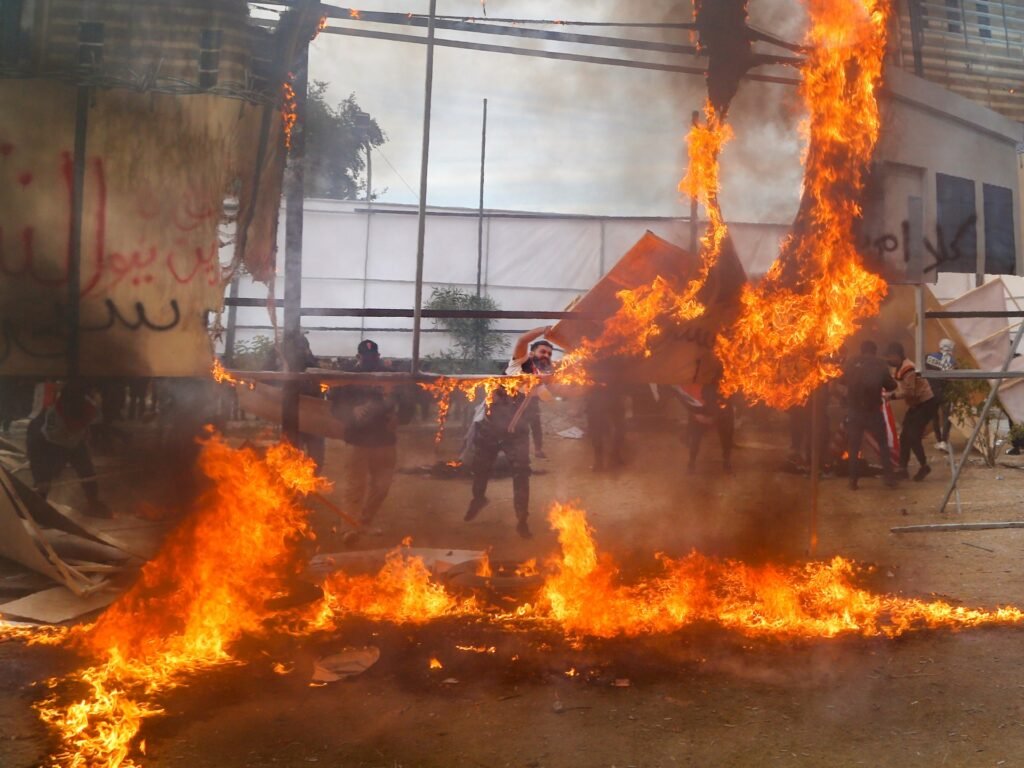Washington is pressing Baghdad to dismantle pro-Iranian paramilitary groups. The move is risky, but it may pay off.
Over the past two years, Iran’s network of allies in the Middle East has taken painful blows. In Syria, the regime of President Bashar al-Assad collapsed. In Lebanon, Hezbollah was forced to lay down its arms under a United States-brokered ceasefire and now faces pressure to disarm. In Yemen, the Houthis were forced to stop disrupting maritime traffic through the Red Sea after massive bombardment of infrastructure and civilian areas by US forces. On Thursday, an Israeli attack killed their prime minister, Ahmed al-Rahawi, along with several other ministers.
Iran’s once-formidable deterrence has spectacularly shrunk. And now it seems it may diminish even further as its influence in Iraq hangs by a thread. The Iraqi government faces increasing pressure from the US to rein in Iranian allies in the Popular Mobilisation Forces (PMF), a formation of predominantly Shia paramilitary groups.
While absorbing the PMF into the Iraqi army – as the US demands – may be a formidable and risky undertaking, if it is achieved, it could strengthen the Iraqi state and sovereignty.
The success of US pressure
The PMF’s short history embodies Iraq’s broader predicament of struggling to achieve stability, security and sovereignty while balancing pressures from the US and Iran.
Its paramilitary groups were formed in response to the rise of ISIL (ISIS) in 2014, which was the direct result of the security vacuum in the country. The Iraqi army had been disbanded in 2003 after the US invasion and the reconstituted force lacked the morale and preparedness to secure the country.
The PMF was successful in stopping ISIL’s advance where the regular army had failed, but many of its members were co-opted by Iran’s Islamic Revolutionary Guard Corps as tools of regional influence.
Today, the PMF still wields enormous influence within Iraq. It encompasses groups that genuinely seek integration with the Iraqi military and hardline factions that remain unapologetically loyal to Iran.
Iraqi Prime Minister Mohammed al-Sudani faces growing US pressure to dissolve the paramilitary groups but also pushback from his own governing coalition, in which the PMF has solid support.
The proposed American solution to absorb compliant units into the regular army while purging militia leaders from positions of authority represents nothing less than a comprehensive restructuring of Iraq’s security architecture. In response, some Iraqi lawmakers have pushed in the opposite direction with legislation that would permanently enshrine the PMF as an independent military force.
The PMF integration bill put forward in March aims to upgrade its status from a temporary force to a permanent, independent military body, complete with its own budget, command structure and military academy. It would also grant the PMF commander a ministerial rank, institutionalising what Washington sees as Iranian influence within Iraq’s government.
US pressure succeeded in getting the bill withdrawn from parliament for now. US Secretary of State Marco Rubio explicitly warned that passing such legislation would trigger a comprehensive review of US-Iraqi relations, potentially including sanctions. This threat carried weight given Washington’s recent imposition of 35 percent tariffs on Iraq.
In June under US pressure, the disbursement of PMF fighters’ salaries was disrupted when Iraqi state-owned Al-Rafidain Bank did not process electronic transactions.
There have been calls from US lawmakers to sanction Al-Rafidain Bank over a 2022 corruption scandal in which $2.5bn of state funds were siphoned off amid allegations that figures close to the PMF were involved.
The inevitable reckoning
The debate in Baghdad is no longer about whether the PMF may remain as currently constituted. That question has been answered in Washington. Al-Sudani faces overwhelming pressure to stop tolerating an Iranian-aligned parallel army within the Iraqi state.
The direction Iraq is going in is clear. Iraq’s political order, long dominated by Iran’s allies and sustained by systematic corruption, faces fundamental transformation under sustained American pressure. Tehran’s last major regional stronghold is under siege, and Washington appears determined not to leave the outcome to chance.
Al-Sudani will bend to American pressure because he has no viable alternative. Factions willing to distance themselves from Tehran will be absorbed into the regular army. Those who refuse will be isolated, dismantled or have their funding severed. This outcome is not a matter of if but when.
The risks are substantial. Paramilitary groups loyal to Iran may violently resist dissolution. Tehran, despite its weakened regional position, retains the capacity to foment chaos across Iraqi territory.
The ghosts of 2006 may rise again, and Iraq, weary of war, may yet be hurled back into civil conflict. But if Iraqi institutions manage to withstand the storm, this would pave the way towards stronger sovereignty – which the Iraqi state has been direly lacking since the 2003 US invasion.
The views expressed in this article are the author’s own and do not necessarily reflect media’s editorial stance.
